九年级第六单元短语和句
Unit6Whenwasitinvented_重点短语句子及其运用2023-2024学年人教版英语九
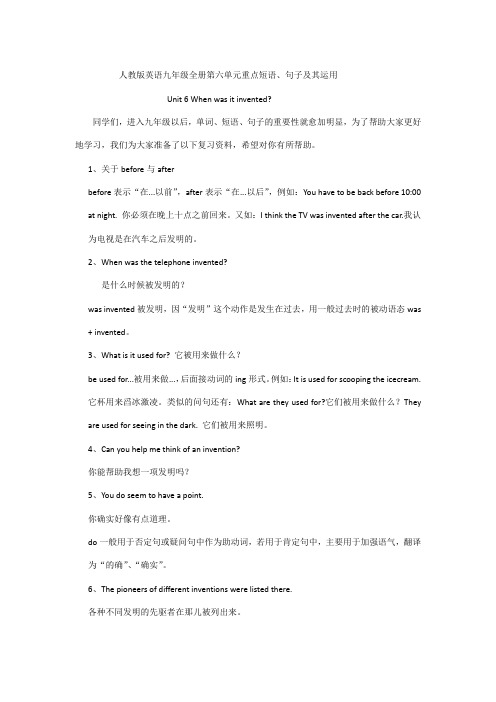
人教版英语九年级全册第六单元重点短语、句子及其运用Unit 6 When was it invented?同学们,进入九年级以后,单词、短语、句子的重要性就愈加明显,为了帮助大家更好地学习,我们为大家准备了以下复习资料,希望对你有所帮助。
1、关于before与afterbefore表示“在...以前”,after表示“在...以后”,例如:You have to be back before 10:00 at night. 你必须在晚上十点之前回来。
又如:I think the TV was invented after the car.我认为电视是在汽车之后发明的。
2、When was the telephone invented?是什么时候被发明的?was invented被发明,因“发明”这个动作是发生在过去,用一般过去时的被动语态was + invented。
3、What is it used for? 它被用来做什么?be used for...被用来做...,后面接动词的ing形式。
例如:It is used for scooping the icecream.它杯用来舀冰激凌。
类似的问句还有:What are they used for?它们被用来做什么?They are used for seeing in the dark. 它们被用来照明。
4、Can you help me think of an invention?你能帮助我想一项发明吗?5、You do seem to have a point.你确实好像有点道理。
do一般用于否定句或疑问句中作为助动词,若用于肯定句中,主要用于加强语气,翻译为“的确”、“确实”。
6、The pioneers of different inventions were listed there.各种不同发明的先驱者在那儿被列出来。
were listed被列出来,一般过去时的被动语态。
新译林版英语九年级上册第六单元单元重点语言点讲解
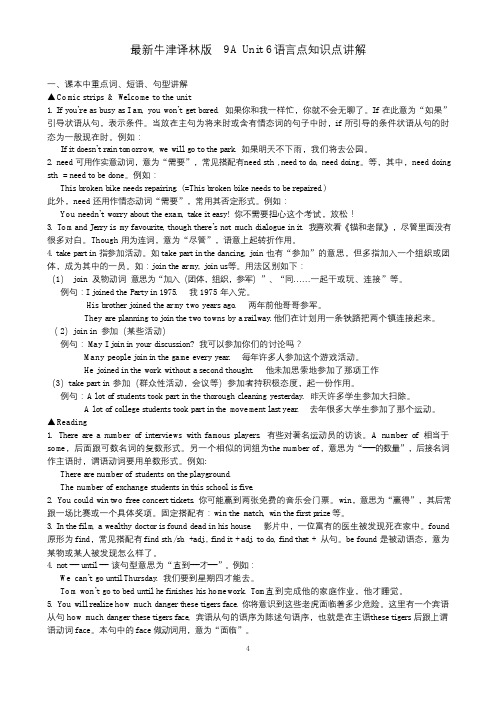
最新牛津译林版9A Uni t 6语言点知识点讲解一、课本中重点词、短语、句型讲解▲Co mic s tr ips & Welco me to the uni t1.I f you’re as busy a s I am, you won’t ge t bored.如果你和我一样忙,你就不会无聊了。
I f在此意为“如果”引导状语从句,表示条件。
当放在主句为将来时或含有情态词的句子中时,i f所引导的条件状语从句的时态为一般现在时。
例如:I f i t doesn’t ra in tom orrow, we wi l l go to the park.如果明天不下雨,我们将去公园。
2. need可用作实意动词,意为“需要”,常见搭配有need s th.,need to do, need do ing。
等,其中,need do i ng s th. = need to be done。
例如:This b roken b ike needs repa i r ing.(=This b roken b ike needs to be repa i red.)此外,need还用作情态动词“需要”,常用其否定形式。
例如:You needn’t wor ry abou t the exam,t a ke i t easy!你不需要担心这个考试,放松!3. To m and Je r ry i s my favour i t e,though the re’s no t much d ia logue in i t.我喜欢看《锚和老鼠》,尽管里面没有很多对白。
Though用为连词,意为“尽管”,语意上起转折作用。
4.t ake par t in指参加活动。
如take par t in the danc ing,jo in也有“参加”的意思,但多指加入一个组织或团体,成为其中的一员。
如:jo in the a rmy,jo in us等。
牛津译林版九年级英语上册9A U6重点短语和句子

9A Unit6 TV programmes1.have nothing to do无事可做2.type of TV programmes 电视节目的种类3.learn a lot about nature, history and real-life events from documentaries从纪录片中了解许多关于自然、历史和真实事件(的知识)4.win a big prize赢得(一个)大奖5. a weekly round-up of…一周…的摘要6.the up-to-date/latest information最新消息7.cover different sports 报道各种体育运动消息8.this week’s programme 本周的节目9. a number of 若干/许多(在there be 结构中,由后面的名词决定be的单复数)10.the number of……的数量(做主语,谓语动词用单数)11.the coming World Cup 即将到来的世界杯12.be covered live 被现场直播13.an Asian pop star 一位亚洲流行音乐明星14.win two free concert tickets 赢得两张免费的音乐会门票15.solve mysteries 解谜16.get scared easily容易受惊17.realize how much danger these tigers //face 意识到这些老虎面临着多大的危险18.hunt them for their fur and bones 为了虎皮和虎骨而猎杀它们(指老虎)19. a polar bear 一个北极熊20.male/female wolf公/母狼21.in the studio 在演播室22.take the minibus 乘中巴车23.have little interest(n.)in sth对某事没什么兴趣 viewing habits 看电视的习惯 ad(ad=advertisement)电视广告26. a waste(n.) of time浪费时间27.the twins 这对双胞胎28.twin brothers/sisters 双胞胎兄弟/姐妹29.receive a message 收到一条短信30.ask (sb) for help (向某人)寻求帮助31.call the police 报警32.be pushed into a minibus 被推进了一辆中巴车33.open the back door of …打开了……的后门34.Aren’t you getting bored with staying at home all day? 你整天待在家里不觉得无聊吗?get bored (with sth.)对某事觉得/感到厌烦sb feel/get bored…sth be boring a boring book/lesson…35.If you’re as busy as I am, you won’t get bored. 如果你和我一样忙,你就不会无聊。
英语九年级第六单元2d知识点
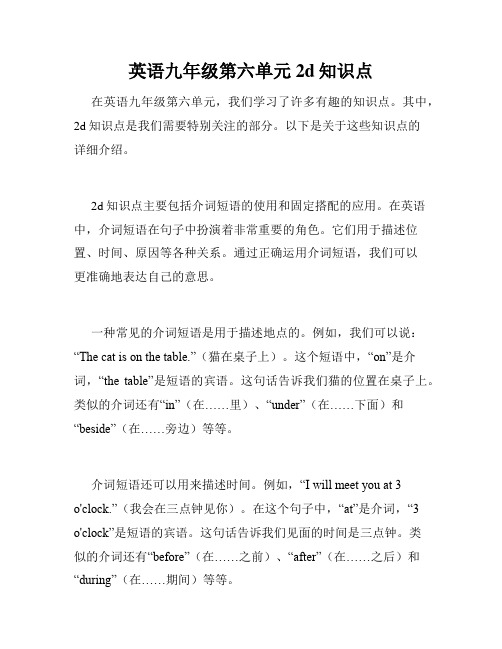
英语九年级第六单元2d知识点在英语九年级第六单元,我们学习了许多有趣的知识点。
其中,2d知识点是我们需要特别关注的部分。
以下是关于这些知识点的详细介绍。
2d知识点主要包括介词短语的使用和固定搭配的应用。
在英语中,介词短语在句子中扮演着非常重要的角色。
它们用于描述位置、时间、原因等各种关系。
通过正确运用介词短语,我们可以更准确地表达自己的意思。
一种常见的介词短语是用于描述地点的。
例如,我们可以说:“The cat is on the table.”(猫在桌子上)。
这个短语中,“on”是介词,“the table”是短语的宾语。
这句话告诉我们猫的位置在桌子上。
类似的介词还有“in”(在……里)、“under”(在……下面)和“beside”(在……旁边)等等。
介词短语还可以用来描述时间。
例如,“I will meet you at 3o'clock.”(我会在三点钟见你)。
在这个句子中,“at”是介词,“3o'clock”是短语的宾语。
这句话告诉我们见面的时间是三点钟。
类似的介词还有“before”(在……之前)、“after”(在……之后)和“during”(在……期间)等等。
另外,固定搭配也是我们在九年级学习的重点。
固定搭配是一些词汇和结构的固定组合,不能随意更改。
例如,“take a shower”(洗澡),我们不能说“have a shower”或者“do a shower”,只能使用“take a shower”。
这是一种习惯性的用法,我们需要注意这些固定搭配的正确使用。
除了地点和时间的描述,介词短语还能用于表达原因、目的和方式等等。
例如,“I went to the library for studying.”(我去图书馆是为了学习)。
在这个句子中,“for”是介词,“studying”是短语的宾语。
这句话告诉我们去图书馆的原因是学习。
其他类似的介词还有“because of”(因为)、“to”(为了)和“by”(通过)等等。
九年级英语第六单元知识点
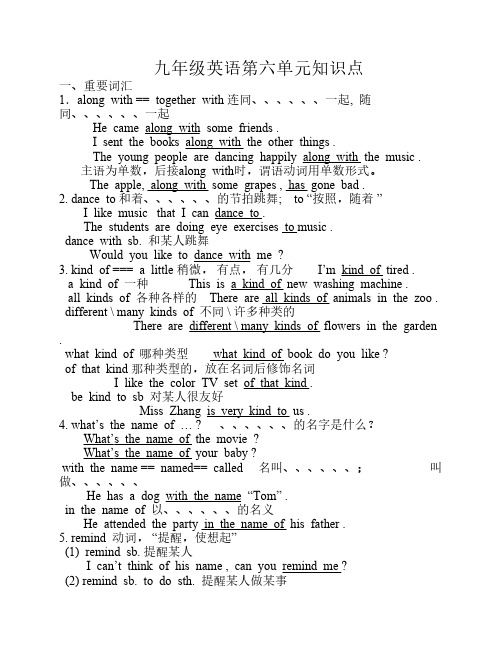
九年级英语第六单元知识点一、重要词汇1.along with == together with 连同、、、、、、一起, 随同、、、、、、一起He came along with some friends .I sent the books along with the other things .The young people are dancing happily along with the music .主语为单数,后接along with时,谓语动词用单数形式。
The apple, along with some grapes , has gone bad .2. dance to 和着、、、、、、的节拍跳舞; to “按照,随着 ”I like music that I can dance to .The students are doing eye exercises to music .dance with sb. 和某人跳舞Would you like to dance with me ?3. kind of === a little 稍微,有点,有几分 I’m kind of tired .a kind of 一种 This is a kind of new washing machine .all kinds of 各种各样的 There are all kinds of animals in the zoo . different \ many kinds of 不同 \ 许多种类的There are different \ many kinds of flowers in the garden .what kind of 哪种类型 what kind of book do you like ?of that kind 那种类型的,放在名词后修饰名词I like the color TV set of that kind .be kind to sb 对某人很友好Miss Zhang is very kind to us .4. what’s the name of … ? 、、、、、、的名字是什么?What’s the name of the movie ?What’s the name of your baby ?with the name == named== called 名叫、、、、、、;叫做、、、、、、He has a dog with the name “Tom” .in the name of 以、、、、、、的名义He attended the party in the name of his father .5. remind 动词, “提醒,使想起”(1) remind sb. 提醒某人I can’t think of his name , can you remind me ?(2) remind sb. to do sth. 提醒某人做某事Remind Jenny to bring her laptop(手提电脑) when she comes .What you said remind me to buy some fruit .(2) remind sb. of \ about sth 提醒某人某事, 使某人想起某事Can you remind us of your plans for the holiday ?The song reminds me of my childhood in the country .(3) remind sb. + that 从句提醒某人、、、、、、She reminded me that we had met before .Please remind tom that he should get up early .6. think of (1) 想起, 记得I can’t think of his name at the moment (现在) .I thought of my hometown when I saw the beautiful scenery .(2 ) 认为 What do you think of …… ?=== How do you like …… ? 你认为…… 怎么样?(3) 考虑, 关心 He always thinks of others .think about 考虑think over 仔细考虑7. stand (1) “ 忍受, 忍耐 ” ; 常与can 或can’t连用stand sth \ sb 忍受某物 \忍受某人 I can’t stand the hot weather here . Most of us couldn’t stand the loud music .stand doing sth 忍受做某 They can’t stand working all day and all night .stand sb . doing sth .忍受某人做某事I can’t stand people dropping litter (垃圾) .(2 ) 站, 立 He was too tired to stand .(3) 座落于…… , 位于……The small village stands at the foot of the mountain .8. do, does, did 放在动词前,起强调作用,意为“ 的确,真的是”I do like this blue hat .They did come yesterday .Do please turn off the light when you leave the house .9.be known\ famous to sb. 为、、、、、、所熟知Yao Ming is known to all the Chinese people .be known as 以、、、、、、身份或职业而出名He is known as a writer .be known for 以、、、、、、物而出名The place is known for its green tea .10.on display = on show 介词短语,“展览,陈列”His pictures are on display in London this month .The things on show were discovered hundreds of years ago . 11. little , a little , few , a fewlittle表示 “ 少, 少得几乎没有 ” , 修饰不可数名词.few也表示 “ 少, 少得几乎没有 ” , 修饰可数名词的复数.a little 表示 “ 有一点点, 但数量不多 ” , 修饰不可数名词.a few也表示 “ 有一点点, 但数量不多 ” , 修饰可数名词的复数.He often feels lonely , because he has few friends here .There is little milk in the fridge (冰箱 ). We have to buy some .---How soon will he be back ? --- In a few days .There is a little water in the bottle , you can drink it .12. whatever=== no matter what 无论什么,无论怎样Whoever == no matter who 无论是谁,无论什么人Whenever == no matter when 无论什么时候,无论何时Wherever == no matter where 无论哪里However === no matter how 无论怎样Whatever \ no matter what you do , you should always do it well .Wherever \ no matter where you go, I will always follow you .Whenever \ no matter you arrive in Beijing , please call me .13. suggest 动词,“ 提议,建议”(1 ) suggest to sb. 向某人提出建议What did you suggest to the manager ?(2 ) suggest doing sth. 建议做某事I suggested going home at once .(3) suggest + that 从句I suggested that we should leave early for the station .14. luck 名词, “ 运气, 好运, 幸运”Good luck to you . 祝你好运.by good luck 幸亏, 侥幸 try one’s luck 碰碰运气lucky 形容词, “ 幸运的” a lucky dog 幸运儿I was lucky enough to catch the last bus .What a lucky boy !be lucky to do sth 幸运做某事I am very lucky to have such a good teacher .luckily 副词, “ 幸运地, 幸亏, 侥幸 ”Luckily , I got to the station on time .15. expect 及物动词,“期望、期待、预料”(1)expect to do sth. 期待做某事,希望做某事I expect to be back on Monday .( 2) expect sb. to do sth . 期望某人做某事They expect me to work on Saturday .(3) expect + that 从句期望、、、、、、;期待、、、、、、。
九年级英语第六单元知识点讲解解析

学科教师辅导讲义学生签字:日期:讲义编号:年级:课时数:学员姓名:辅导科目:英语学科教师:授课日期及时段教学目标学习内容Unit 6 When was it invented?【重点词组】1. shoes with special heels 特殊后跟的鞋子2. hot ice cream scoop 热的冰其淋勺子3. run on electricity 电动的4. be used for 被用作5. the subject for my school project 学校项目的课题6. our daily lives 我们的日常生活7. have a point 有点道理8. by accident 偶然,意外地9. over the open fire 在火堆上10. fall into the water 落入水中11. take place 发生12. without doubt 毫无疑问13. at a low price 以一个很低的价格14. translate the book into different language 把书翻译成不同种的语言15. all of sudden 突然16. by mistake 错误地17. a much-loved and active sport 一个深受喜爱并且积极的运动18. divide…into 把…分开19. stop sb from doing sth 阻止某人做某事20. look up to 钦佩,仰慕21. the professional basketball groups 职业篮球机构22. use someone else’s idea 借用其他人的想法【重点句式】1. I think the TV was invented before the car. 我认为电视是在轿车之前发明的。
2. ---When was the telephone invented? --- 电话是什么时候发明的?--I think it was invented in 1876. ---我认为电话是在1876年被发明的。
九年级英语上册第六单元知识点

九年级英语上册第六单元知识点Unit 6 When was it invented?一.重点短语1.It's my pleasure.=My pleasure.我的荣幸2.seem+to+动词原形好像做某事3.such a great invention如此伟大的一项发明4.think of=think about想到,考虑5.in our daily lives在我们的日常生活中6.in my daily life在我的日常生活中7.have a point有道理8.by accident偶然地,意外地9.over an open fire在篝火上10.it mentioned that它提到11.It is said that据说12.It is believed that人们相信13.fall into(过去式fell into)=drop into掉进…14.in the 19th century在19世纪15.spread to other countries传播到其他国家16.at a low price以很低的价格17.bring(brought)sth.to sp.把某物带到某处18.all of a sudden突然地19.less than少于,不到more than=over超过20.without doubt毫无疑问21.at that time在那时22.advise sb(not)to do sth建议某人(不要)做某事23.start doing sth开始做某事24.work on sth致力于某事25.(be)similar to与……相似26.the Olympics奥运会27.by mistake错误地,无意地28.make a mistake犯错29.divide...into…把…分成…30.in the end=at last=finally最后31.at the same time同时32.teach(taught)sb to do sth教某人做某事e up with想出34.encourage sb.to do sth.鼓励某人做某事35.the purpose of……的目的36.stop sb from doing sth阻止某人做某事37.look up to sb.钦佩某人38.look up the word查找单词39.work together一起工作40.I want to achieve my dream.我想实现梦41.My dream will come true.我的梦想会实现42.work hard努力工作43.on a hard floor在坚硬的地板上44.lead to导致leader领导,引路人45.Don't mention it.不客气,不用谢46.translate...into....把…翻译成…47.be used for doing sth=be used to do sth48.dream of doing sth梦想做某事二.句型用法1.be used to do被用来做某事be used as被用作…be used by sb.被某人使用2.help sb do sth.=help sb.to do sth.帮助某人做某事3.make a decision to do sth.=decide to do sth.决定做某事4.make sb.+adj.使某人怎么样make sb do sth使某人做某事be made to do sth被使唤去做某5..in this way这样,用这种方式三.语法全解1.some time一段时间sometimes有时some times几次sometime某个时候2.one of the world's favorite drinks世界最受欢迎的饮料之一.one of…之一,后面的名词用复数(一般要加S),动词用单数(一般要加S);favorite,最喜欢的,前面要用―谁的‖.3.thousand千hundred百million百万,当它们前面有数字的时候,它们本身不能加S,当它们后面有of的时候它们要加S,但前面的数字和后面的of不能同时存在4.not…until直到…才,I don't go to sleep until 11 every day.我每天直到11点才睡觉。
人教版九年级英语全一册知识点Unit6知识点总结

Unit 6 When was it invented? 重点知识归纳解析【重点单词】1. project n. 项目,工程;2. pleasure n. 高兴,愉快;3. daily adj. 日常的,每日的;4. mention v. 提到,说到;5. nearly adv.几乎,差不多;6. boil v. 煮沸,烧开;7. remain v. 保持不变;剩余;8. national adj.国家的,民族的;9. low adj.低的,矮的;10. translate v.翻译;11. lock v.锁上;n. 锁;12. sudden adj. 突然的13. crispy adj. 脆的;酥脆的;14. salty adj.咸的;15. sour adj.酸的,有酸味的;16. customer n.顾客。
17. Canadian 加拿大的,18. divide v.分开,分散;19. hero n英雄,男主角;20. professional adj. 职业的,专业的;【重点词组】1. shoes with special heels 特殊后跟的鞋子2. hot ice cream scoop 热的冰其淋勺子3. run on electricity 电动的4. be used for 被用作5. the subject for my school project 学校项目的课题6. our daily lives 我们的日常生活7. have a point 有点道理8. by accident 偶然,意外地9. over the open fire 在火堆上10. fall into the water 落入水中11. take place 发生12. without doubt 毫无疑问13. at a low price 以一个很低的价格14. translate the book into different language 把书翻译成不同种的语言15. all of sudden 突然16. by mistake 错误地17. a much-loved and active sport 一个深受喜爱并且积极的运动18. divide…into 把…分开19. stop sb from doing sth 阻止某人做某事20. look up to 钦佩,仰慕21. the professional basketball groups 职业篮球机构22. use someone else’s idea 借用其他人的想法【重点句式】1. I think the TV was invented before the car. 我认为电视是在轿车之前发明的。
九年级英语上册第六单元重要知识点总结

九年级英语上册第六单元重要知识点总结九年级英语上册第六单元重要知识点总结Unit6Whenwasitinvented?【重点短语】1.byaccident偶然地;意外地2.withoutdoubt毫无疑问的;的确3.byistae错误地4.looupto钦佩;仰慕5.taeplace发生;出现6.allofasudden突然;猛地7.divide…into…把……分成......8.theolypics奥林匹克运动会9.thestyleof……的样式10.beusedfor被用于……【考点详解】1.inventv.发明inventorn.发明家inventionn.发明2.beusedfordoing用来做…(是被动语态)(这个短语的考点有两点,一是usedfor的意思,二是for后面用动名词) Pensareusedforwriting.笔是用来写的。
3.给某人某样东西givesth.tosb.Igaveapentohi.我给他一支笔。
givesb.sth.Igavehiapen.我给他一支笔。
4.allday整天5.saltyadj.咸的saltn.盐6.byistae错误地(犯错:aeistae,这些常见的短语大家务必要掌握)Itootheubrellabyistae.我不小心拿错了雨伞。
8.byaccident意外,偶然(常见短语,考的最多的是它的意思)Ietherbyaccidentatbusstop.我在公共汽车站意外地见到了她。
9.not…until…直到…才…(重中之重,这个用法非常重要!)Ididn’tgotobeduntilIfinishedywor.我直到完成我的工作才去睡觉。
10.accordingto+名词,根据…accordingtothisarticle根据这篇文章11.overanopenfire野饮12.leafn.叶子复数形式leaves13.nearbyadj.附近的14.fallinto落入,掉进Theleaffellintotheriver.叶子落入了河里。
新译林版英语九年级上册第六单元单元重点语言点讲解
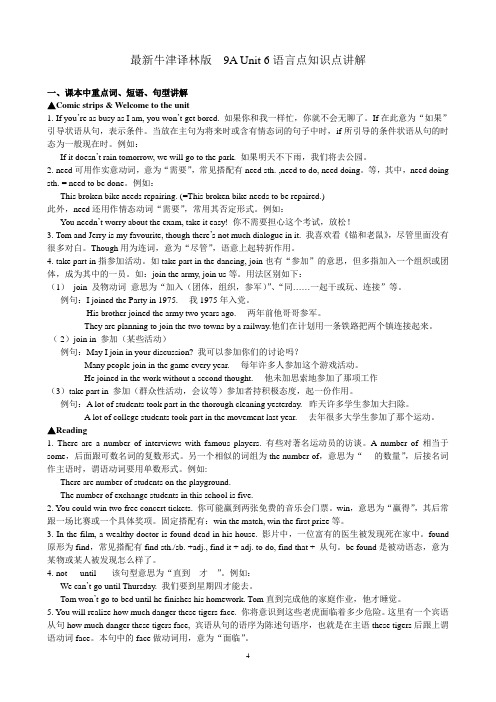
最新牛津译林版9A Unit 6语言点知识点讲解一、课本中重点词、短语、句型讲解▲Comic strips & Welcome to the unit1. If you’re as busy as I am, you won’t get bored. 如果你和我一样忙,你就不会无聊了。
If在此意为“如果”引导状语从句,表示条件。
当放在主句为将来时或含有情态词的句子中时,if所引导的条件状语从句的时态为一般现在时。
例如:If it doesn’t rain tomorrow, we will go to the park. 如果明天不下雨,我们将去公园。
2. need可用作实意动词,意为“需要”,常见搭配有need sth. ,need to do, need doing。
等,其中,need doing sth. = need to be done。
例如:This broken bike needs repairing. (=This broken bike needs to be repaired.)此外,need还用作情态动词“需要”,常用其否定形式。
例如:You needn’t worry about the exam, take it easy! 你不需要担心这个考试,放松!3. Tom and Jerry is my favourite, though there’s not much dialogue in it. 我喜欢看《锚和老鼠》,尽管里面没有很多对白。
Though用为连词,意为“尽管”,语意上起转折作用。
4. take part in指参加活动。
如take part in the dancing, join也有“参加”的意思,但多指加入一个组织或团体,成为其中的一员。
如:join the army, join us等。
用法区别如下:(1)join 及物动词意思为“加入(团体,组织,参军)”、“同……一起干或玩、连接”等。
人教版九年级英语unit 6重点短语句子归纳(中考读背材料)

Unit 6 When was it invented?重点短语句子1.invent v. 发明,创造inventor n.发明者,发明家invention n.发明,发明物2.style n.样式,款式,风格in style=in fashion 流行,时髦out of style=out of fashion 过时3.please 请,(使)高兴/满意pleased adj.高兴的,满意的pleasant adj.令人愉快的pleasure n.愉快,高兴,快乐的事for pleasure 为了娱乐,消遣With pleasure.乐意效劳(用来回答请求帮忙) It’s a pleasure./A pleasure.It’s my pleasure./My pleasure.不用谢(用来回答感谢)4. in our daily life/lives 在日常生活中5. point n.要点,得分have a point 有道理point out指出point at指着point to指向6. mention … to sb. 向某人提及…mention doing sth 提及做某事7. bring…to sw. 把…带到某地be brought to sw. 被带到某地bring out the best in sb. 使某人显露出最好的一面8. shoes with special heels带特别鞋跟的鞋子9. run v.跑,管理,经营,运行run on electricity通电运行10. be used to do/be used for doing 被用于做11. change the style of the shoes改变鞋子的款式12. serve v.服务,提供,端上serve sth 提供某物serve sb. (with)sth. 给某人端上serve as 作为,充当,起…作用13. small inventions that changed the world改变世界的小发明14. such a great invention=so great an invention这么伟大的发明15. at that time 在那时,当时16. spread to(spread…to…把…传播到)17. accident n.事故,意外事件accidental adj. 偶然的,意外的by accident=by chance 偶然地,意外地by mistake错误地,无意地18.boil drinking water烧开水boiling water 正在沸腾的水boiled water 烧开的水19.over an open fire在户外的火上20.fall/drop into 落入,掉入fall down(from...)滑倒,倒下fall over 向前摔倒fall off 跌落,从…上掉下来fall behind 落后,跟不上fall in love with 爱上...21.sb./sth. remain+n./adj./介词短语保持,仍然是…remain doing 继续做…sth. remain to be done 留待…sth/sb remain 停留,留下22.a nice/pleasant smell一种好闻的气味(n.)smell nice/good 闻起来很好(v.)23.a good taste好品味/味道taste delicious 尝起来美味24.the saint of tea/poem/chess茶圣/诗圣/棋圣25. produce a product生产商品26.in less than 100 years在不到一百年的时间里27. take place发生,举办sth. happen to sb.某事发生在某人身上(偶然或突然发生的事)happen to do sth.碰巧做某事28. translate… into 把...翻译成29. all of a sudden=suddenly 突然地30. ring the bell 按响门铃ring sb up给某人打电话31. musical instrument 乐器32. the nature of tea茶道33. without/no doubt毫无疑问sb. doubt if/whether…sb. don’t doubt that…Do you doubt that…(宾语从句中,肯定句连接词用if/whether 否定句和疑问句用that)34.the 6th and 7th centuries公元六,七世纪35.the tea trade茶叶贸易(tea is traded.)36.at a low /high/special price以低/高/特价37.raise/lower the heels升高/降低鞋跟38.salty and crispy又咸又脆39.break the rule/law违反规定/法律break in 打断(谈话),闯入break into 闯入,破门而入break into tears 突然大哭,放声大哭break into laughter突然大笑,哄堂大笑break down 发生故障,失败,分解崩溃,身体垮掉break up 打碎,破碎;结束;解散break out 爆发,突发break off 折断,突然停止,暂停40.an instrument similar to a telephone类似电话的乐器41.today in history历史上的今天42.adj.+enoughenough +n.43.in the end/at last/finally 终于,最后44.Be born in…出生于…45.divide…into…把…分成…be divided into …被分成…46.at the same time 同时47.the popularity of……的普及48.It is said/believed/heard/reported that +从句据说/据可信消息/据听说/据报道49.sour/sweet/bitter/hot/salty酸/甜/苦/辣/咸50.mind map思维导图51.stop/keep/prevent/protect…from doing…阻止/防止…做…52.dream of/about (doing) sth.梦到/梦想(做)某事53.the number of……的数目a number of 大量,许多54.look up to 仰视,钦佩look down on/upon 看不起,轻视look up 查阅,查询,抬头看look into 调查look through 浏览,温习,仔细查看look out 当心,小心look forward to 盼望look around 环顾四周look back 回头看,回顾look over 检查,察看,从上面看look away 转移目光55.become like sb. 成为像某人那样的人56.achieve/realize one’s dream实现梦想dream comes true梦想实现57.encourage sb. to do sth.鼓励某人做某事58.a popular game to watch/play 人们喜欢观看的/参与的运动59.on a hard floor在硬地板上60.work together合作(team work团队合作)61.the competing team竞争队伍62.fried chips薯片,薯条63.professional adj.职业的,专业的profession n. 职业,专业64.the first sentence that was said on the telephone (世界上)电话里说的第一句话65.the development of ……的发展66.make a list of…列出…的清单take/make notes 记笔记make up 弥补,组成,化妆,整理make for 导致,有助于make sense 有意义,讲得通make out 理解,辨认出make sure 确信make use of 使用,利用make a difference 有影响,有关系make sb. do sth. 让某人做某事be made to do sth. 被迫做某事make sb. done 让某人被…make sb. /sth. +adj. 使某人…make sb. sth.=make sth. for sb.为某人制作某物make sb. sb. 使某人成为某人67.have sb. do sth. 让某人做某事have sth. done 让别人做某事68.someone else’s idea 别人的想法69.The purpose of……的目的70.not only…but also…不仅…而且…。
九年级英语第六单元

九年级英语第六单元一、重点单词。
1. prefer.- 用法:prefer sth.(更喜欢某物);prefer doing sth.(更喜欢做某事);prefer to do sth.(宁愿做某事);prefer sth. to sth.(比起……更喜欢……)。
例如:I prefer apples to bananas.(比起香蕉我更喜欢苹果。
)2. lyrics.- 名词,意为“歌词”。
例如:I like the lyrics of this song.(我喜欢这首歌的歌词。
)3. smooth.- 形容词,“平滑的;悦耳的”。
例如:The music is very smooth.(这音乐很悦耳。
)4. spare.- 形容词,“空闲的;不用的”;也可作动词,“抽出;匀出”。
例如:I have some spare time.(我有一些空闲时间。
);Can you spare me a few minutes?(你能匀给我几分钟吗?)5. director.- 名词,“导演;部门负责人”。
例如:The director of this movie is very famous.(这部电影的导演很有名。
)6. case.- 名词,在这里有“情况;实情”的意思。
例如:In that case, we should change our plan.(在那种情况下,我们应该改变我们的计划。
)7. war.- 名词,“战争;战争状态”。
例如:The two countries were at war.(这两个国家处于战争状态。
)8. stick.- 动词,“粘贴;将……刺入”,过去式和过去分词是stuck。
例如:Stick the picture on the wall.(把这幅画贴在墙上。
)9. down.- 形容词,“悲哀;沮丧”。
例如:He looks a bit down today.(他今天看起来有点沮丧。
人教版九年级全一册英语Unit6单元语法知识点总结
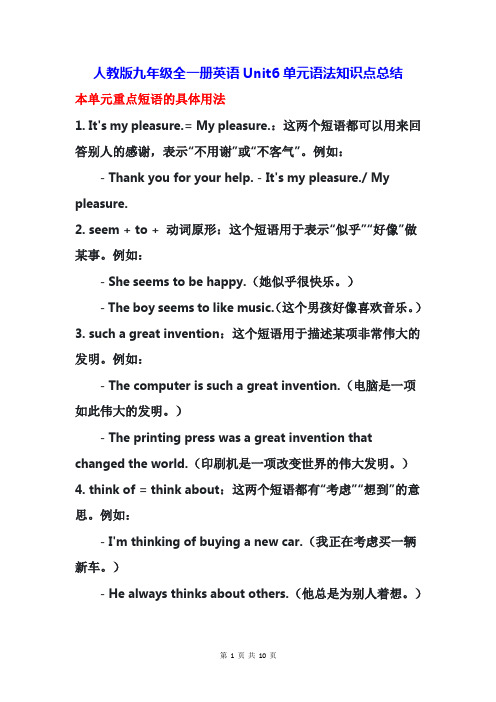
人教版九年级全一册英语Unit6单元语法知识点总结本单元重点短语的具体用法1. It's my pleasure.= My pleasure.:这两个短语都可以用来回答别人的感谢,表示“不用谢”或“不客气”。
例如:- Thank you for your help. - It's my pleasure./ My pleasure.2. seem + to + 动词原形:这个短语用于表示“似乎”“好像”做某事。
例如:- She seems to be happy.(她似乎很快乐。
)- The boy seems to like music.(这个男孩好像喜欢音乐。
)3. such a great invention:这个短语用于描述某项非常伟大的发明。
例如:- The computer is such a great invention.(电脑是一项如此伟大的发明。
)- The printing press was a great invention that changed the world.(印刷机是一项改变世界的伟大发明。
)4. think of = think about:这两个短语都有“考虑”“想到”的意思。
例如:- I'm thinking of buying a new car.(我正在考虑买一辆新车。
)- He always thinks about others.(他总是为别人着想。
)5. in our daily lives/ in my daily life:这两个短语用于描述在日常生活中的情况或活动。
例如:- Technology plays an important role in our daily lives.(科技在我们的日常生活中起着重要的作用。
)- In my daily life, I like to read books and exercise.(在我的日常生活中,我喜欢读书和锻炼。
九年级英语上册第六单元知识点讲解Grammar
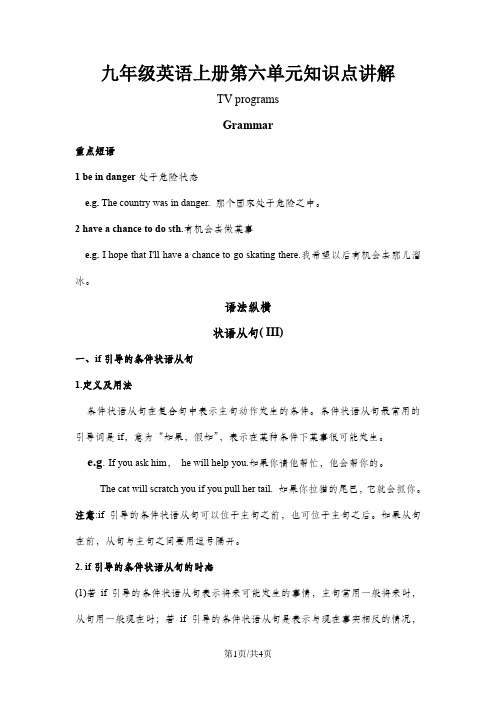
九年级英语上册第六单元知识点讲解TV programsGrammar重点短语1 be in danger处于危险状态e.g. The country was in danger. 那个国家处于危险之中。
2 have a chance to do sth.有机会去做某事e.g. I hope that I'll have a chance to go skating there.我希望以后有机会去那儿溜冰。
语法纵横状语从句( III)一、if引导的条件状语从句1.定义及用法条件状语从句在复合句中表示主句动作发生的条件。
条件状语从句最常用的引导词是if,意为“如果,假如”,表示在某种条件下某事很可能发生。
e.g. If you ask him,he will help you.如果你请他帮忙,他会帮你的。
The cat will scratch you if you pull her tail. 如果你拉猫的尾巴,它就会抓你。
注意:if引导的条件状语从句可以位于主句之前,也可位于主句之后。
如果从句在前,从句与主句之间要用逗号隔开。
2. if引导的条件状语从句的时态(1)若if引导的条件状语从句表示将来可能发生的事情,主句常用一般将来时,从句用一般现在时;若if引导的条件状语从句是表示与现在事实相反的情况,主句用一般过去时,从句也要用表示过去的相应时态。
e.g. If you leave now ,you will be regretful.如果你现在离开,你会后悔的。
If I didn't apologize ,I would feel guilty.如果我不道歉,我会感到内疚。
(事实:道歉了)注意:在条件状语从句中,主句只能用will或shall表示一般将来时,而不能用be going to。
(2)在含有if引导的条件状语从句的复合句中,主句也可含有情态动词或者是一个祈使句,从句用一般现在时。
九年级英语:Unit_6_When_was_it_invented____短语及综合测试题
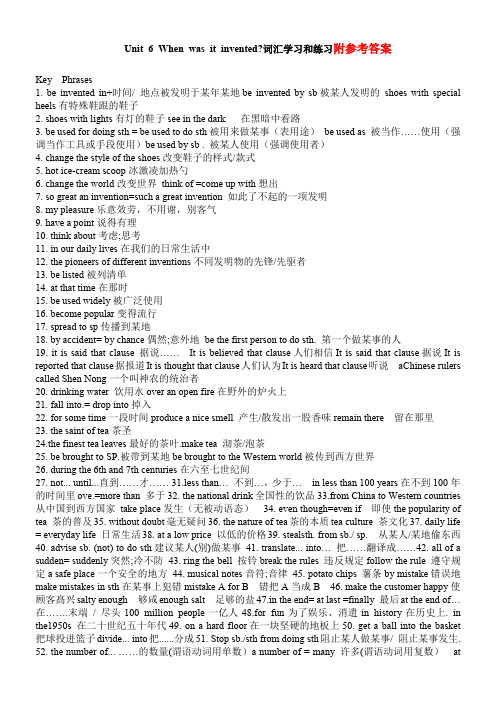
Unit 6 When was it invented?词汇学习和练习附参考答案Key Phrases1. be invented in+时间/ 地点被发明于某年某地be invented by sb被某人发明的shoes with special heels有特殊鞋跟的鞋子2. shoes with lights有灯的鞋子see in the dark 在黑暗中看路3. be used for doing sth = be used to do sth被用来做某事(表用途)be used as 被当作……使用(强调当作工具或手段使用)be used by sb . 被某人使用(强调使用者)4. change the style of the shoes改变鞋子的样式/款式5. hot ice-cream scoop冰激凌加热勺6. change the world改变世界think of =come up with想出7. so great an invention=such a great invention 如此了不起的一项发明8. my pleasure乐意效劳,不用谢,别客气9. have a point说得有理10. think about考虑;思考11. in our daily lives在我们的日常生活中12. the pioneers of different inventions不同发明物的先锋/先驱者13. be listed被列清单14. at that time在那时15. be used widely被广泛使用16. become popular变得流行17. spread to sp传播到某地18. by accident= by chance偶然;意外地be the first person to do sth. 第一个做某事的人19. it is said that clause 据说…… It is believed that clause人们相信It is said that clause据说It is reported that clause据报道It is thought that clause人们认为It is heard that clause听说aChinese rulers called Shen Nong一个叫神农的统治者20. drinking water 饮用水over an open fire在野外的炉火上21. fall into.= drop into掉入22. for some time一段时间produce a nice smell 产生/散发出一股香味remain there 留在那里23. the saint of tea茶圣24.the finest tea leaves最好的茶叶.make tea 沏茶/泡茶25. be brought to SP.被带到某地be brought to the Western world被传到西方世界26. during the 6th and 7th centuries在六至七世纪间27. not... until...直到……才…… 31.less than… 不到…,少于…in less than 100 years在不到100年的时间里ove.=more than 多于32. the national drink全国性的饮品33.from China to Western countries 从中国到西方国家take place发生(无被动语态)34. even though=even if 即使the popularity of tea 茶的普及35. without doubt毫无疑问36. the nature of tea茶的本质tea culture 茶文化37. daily life = everyday life 日常生活38. at a low price 以低的价格39. stealsth. from sb./ sp. 从某人/某地偷东西40. advise sb. (not) to do sth建议某人(别)做某事41. translate... into… 把……翻译成……42. all of a sudden= suddenly突然;冷不防43. ring the bell 按铃break the rules 违反规定follow the rule 遵守规定a safe place一个安全的地方44. musical notes音符;音律45. potato chips 薯条by mistake错误地make mistakes in sth在某事上犯错mistake A for B 错把A当成B 46. make the customer happy使顾客髙兴salty enough 够咸enough salt 足够的盐47.in the end= at last =finally 最后at the end of…在…….末端/ 尽头100 million people一亿人48.for fun为了娱乐、消遣in history在历史上. in the1950s 在二十世纪五十年代49. on a hard floor在一块坚硬的地板上50. get a ball into the basket 把球投进篮子divide... into把......分成51. Stop sb./sth from doing sth阻止某人做某事/ 阻止某事发生.52. the number of... ……的数量(谓语动词用单数)a number of = many 许多(谓语动词用复数)atthe same time 同时53. look up to钦佩;仰慕54.encourage sb. to do sth.鼓励某人做某事not only... but also... 不仅……而且…… e up with = think up 想出56.become an Olympic event成为一项奥运会项目the popularity of … …的流行,普及57.achieve one’s dreams 实现某人梦想58. dream of doing sth梦想干某事一选择题( ) 1.Mo Yan is famous _______ an excellent writer. And China is famous ______ culture.A. for; asB. as; forC. because; asD. as; for( ) 2. --When will A Bite of China II begin tonight?--It ________ for ten minutes.A. will beginB. has begunC. will be onD. has been on( ) 3. Sixteen-year-olds shouldn’t ______ to go to an Internet bar.A. be allowedB. be allowC. allowD. are allowed( ) 4. ---I’m not hungry but thirsty.---________A I’m hungry, too.B What about some cakes?C I’m happy to hear that.D How about a glass of water?( ) 5.— We can use QQ to talk with each other online.— Really? Could you please show me _______ it?A. what to doB. how to doC. when to doD. why to do( ) 6.As we know, _____of us likes pollution.A. no oneB. noneC. someoneD. nothing( ) 7.—Lily, _____ you _____ your ticket?—Not yet!A. did; findB. have; foundC. has; foundD. do; find( ) 8.When we went into the park, we were saw _____ Chinese Kungfu.A. playsB. played C .to play D. playing( ) 9.The invention was Wednesday afternoon.A. invented,inB. invented ,onC. inventing,of D, invent,for( ) 10. --------Remember this , children .________ you study,________ knowledge you will get.--------We know, Mr. Green.A. The harder, the lessB. The hard, the moreC. The harder, the moreD. harder, more( ) 11. Our teacher told us that the eartharound the sun.A. wentB. goC. goesD. would go( ) 12. Our classroom _____ every day, so it’s very clean.A. cleansB. is cleaningC. is cleanedD. cleaned( ) 13. Would you like to tell me _________next, Mr. Feng?A. what should we doB. we should do whatC. what we should doD. should we do what ( ) 14.——How is your grandma? ——She’s fine. She used to _____TV at home after supper. But now she is used to _____out for a walk.A. watch; goB. watching; goC. watching; goingD. watch; going( ) 15.Windows _________ glass,the paper ________ bamboo. A. be made of , be made ofB. are made of , is made ofC. are made of ,is made fromD. are made from., is made of( ) 16. — My dream is to build university on the moon some day.— It sounds likeunusual dream. I wish you could realize it.A. a; aB. an; aC. a; anD. an; an( ) 17. I didn’t think maths _______ important at that time.A. isB. wereC. areD. was( ) 18.nice glasses! Where did you buy them?A. HowB. What aC. WhatD. How( ) 19. Excuse me, would you please tell me ______buy a digital camera on line?A. what to B .how to C. what I can D. how can I( ) 20. Someone says, “Money is everything.” But I think time is _____ important than moneyA. muchB. lessC. much leastD. even more( ) 21 ____ Jack ____ Jim has been to to China, but ___ of them knows little about China in fact.A. Either; or; bothB. Neither; nor; bothC. Not only; but also; neitherD. Both;and; neither( ) 22.We don't know _________ he will come tomorrow._________ he comes,We 'll tell you.A.if;Whether B.whether;Whether C.if;That D.if;If()23.The knife is used ________ cutting.A.for B.as C.by D./()24.—I'm very________ with my own cooking. It looks nice and smells delicious.—Mm, it does have a ________ smell.A.pleasant; pleased B.pleased; pleased C.pleasant; pleasant D.pleased; pleasant ()25.The song came to my ears ________ accident.A.by B.with C.in D.for()26.The meeting ________ last Sunday night.A.happening B.happened C.took place D. takes place()27.Who were the zippers invented ________?A.by B.for C.with D.at()28.—Thanks for the delicious food. —________.A.No, thanks B.That's right C.All right D.My pleasure()29.The corn, potato and tomato are plants that were first ______ in America by Columbus.A.invented B.grown C.discovered D.found out()30.The car ________ by the policeman because the driver was drunk (喝醉的).A.stopped B.was stopped C.were stopped D.stops二完形填空Some years ago, Chinese high school students would show their school-bags, new clothes or new pens to their classmates when the new term started, Today, however, all have 1 .If you still come back to school 2 only these things, you are falling out-of-date(过时). Students in big cities like to bring the latest high-tech things to school, and feel happy and 3 to show off(炫耀) these things to_4_. Mobile phones, MP3 players, CD players, electronic dictionaries, the list is endless.Young people think that, living in the twenty-first century, they must keep up with the _5. They don’t want to fall 6_ . Besides, they think _7_ they need to keep in touch with their classmates, so they need mobile phones. They also like to _8_ the pop music, so they need CD players. They explain that, 9_ like electronic dictionaries, these can be _10 in their study, 11 . They think that their parents should understand 12_ they want these things.Foreign students will also bring some latest high-tech things when they 13to school at the beginning of a new term. _14_ , they often use the money which they made by themselves during the holiday to 15_ these high-tech things that they want.( ) 1. A. changed B. come C. joined D. stopped ( ) 2. A. to B. from C. of D. with( ) 3. A. right B. lucky C. nice D. pleased ( ) 4. A. other B. the other C. others D. he others( ) 5. A. times B. days C. years D. date ( ) 6. A. down B. off C. behind D. back( ) 7. A. that B. how C. if D. which ( ) 8. A. hear B. listen to C. read D. play( ) 9. A. look B. just C. feel D. something ( ) 10. A. new B. modern C. latest D. useful( ) 11. A. also B. too C. either D. then ( ) 12. A. where B. which C. what D. why( ) 13. A. return B. return back C. reach D. arrive ( ) 14. A. But B. However C.So D. Still( ) 15. A. borrow B. buy C. lend D. take三首字母填空。
人教版九年级英语第六单元知识点梳理
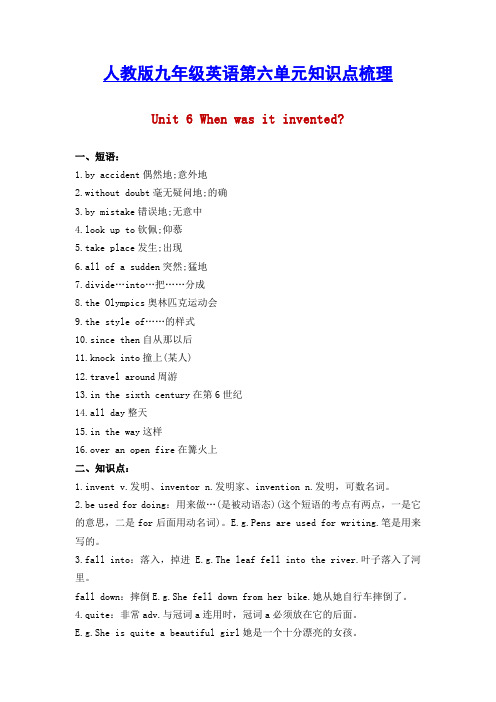
人教版九年级英语第六单元知识点梳理Unit 6 When was it invented?一、短语:1.by accident偶然地;意外地2.without doubt毫无疑问地;的确3.by mistake错误地;无意中4.look up to钦佩;仰慕5.take place发生;出现6.all of a sudden突然;猛地7.divide…into…把……分成8.the Olympics奥林匹克运动会9.the style of……的样式10.since then自从那以后11.knock into撞上(某人)12.travel around周游13.in the sixth century在第6世纪14.all day整天15.in the way这样16.over an open fire在篝火上二、知识点:1.invent v.发明、inventor n.发明家、invention n.发明,可数名词。
2.be used for doing:用来做…(是被动语态)(这个短语的考点有两点,一是它的意思,二是for后面用动名词)。
E.g.Pens are used for writing.笔是用来写的。
3.fall into:落入,掉进 E.g.The leaf fell into the river.叶子落入了河里。
fall down:摔倒E.g.She fell down from her bike.她从她自行车摔倒了。
4.quite:非常adv.与冠词a连用时,冠词a必须放在它的后面。
E.g.She is quite a beautiful girl她是一个十分漂亮的女孩。
5..pleased:adj.高兴的、满意的。
表示外部因素引起人发自内心的欣慰和愉快; pleasant:adj.令人愉快的、舒适的。
指天气、时间、旅行令人高兴和愉快; please:v.使高兴,使同意。
6.battery-operated:adj.电池控制的,是名词+动词的运动分词构成的合成形容词。
人教版九年级英语第六单元知识点总结

人教版九年级英语第六单元知识点总结Unit6 When was it invented?一.单词XXX not only…but also look up to XXX.My camera XXX.XXX.XXX?When was your camera XXX?二1.in style/out of style2. please v媚谄;请;→pleasure n舒畅→pleased adj.(人)兴奋的→pleasant adj.(物)使人舒畅的(1)With pleasure.我的侥幸(对方提出请求,应允对方的用语。
未供给匡助前。
)(It is )a pleasure/(It is )my pleasure.我的侥幸(是对方称谢时的答语。
供给匡助后。
)--Can you help me carry the box.--With pleasure./I would love to./No problem.--Thank you--(It is )a pleasure/(It is )my pleasure.(2)be pleased to do XXX舒畅做某事XXX对….惬意It’s my _____________(please) to help you.他对这辆车很惬意。
_____________________________.(3)What pleased you best?3.XXX it.(1)--I am sorry.-- XXX it.(2)—Thank you--XXX it.4.XXX chanceby XXXXXX5.XXX几乎,接近。
常可替换。
(1)但有very pretty not润饰时大概详细数字前经常利用nearly.语Not XXX远非,完全不very(pretty) nearly简直(2)almost可用于none no never nobody nothing等否定词之前,但XXX(计划,必然)/happen(偶然)均无被动。
九年级上册英语第6单元笔记

九年级上册英语第6单元笔记一、重点短语1. used to do 过去常常做某事2. be used to doing sth 习惯做某事3. be used for 被用来做某事4. be used as 被当作……使用5. the opposite of …的相反词6. in the opposite way 以相反的方式7. in the same way 以同样的方式8. in the past 在过去9. most of the time 大部分时间10. at the beginning of 在……开始的时候11. at the end of 在……结束的时候12. make sb do sth 让某人做某事13. feel sb doing sth 感觉到某人正在做某事14. sound like 听起来像15. in the future 在将来16. be different from 与……不同17. in one’s opinion 在某人看来18. according to 根据19. no longer 不再20. not…any more 不再21. as well 也,又,同样地22. in the same way 用同样的方式23. go to sleep 入睡24. wake up 醒来,叫醒25. turn off 关掉(电器)26. take off 起飞,脱下,取消,移除,让……休息27. fall asleep 入睡,睡着28. be asleep 在睡着的状态中(表状态)29. go to bed 上床睡觉,就寝(表动作)30. get up 起床(表动作)31. stay up 熬夜,不睡觉,坚持,保持(表状态)32. all the time 一直,始终,屡屡(置于动词、形容词、副词之后)33. on time 按时,准时。
副词形式:时间处于合适的时间点;介词形式:某事处于合适的时间点。
人教版英语九年级全一册第六单元重点短语归纳

the Olympics奥林匹克运动会
divide...into...把……分成……
at the same time同时
stop...from doing...阻止……做……
dream of = dream about梦想;向往
not only...but also...不但……而且……
the number of...……的数量
a number of...大量的……
look up to钦佩;仰慕
achieve one’s dream实现某人的梦想
take notes记笔记
lead to导致
at a low price以低价
translate...into...把……翻译成……
all of a sudden突然;猛地
work on从事;致力于
by mistake错误地;无意中
in the end最后
a cook called George Crum = a cook named George Crum一个名叫乔治·克拉姆的厨师
九年级全一册第六单元重点短语归纳
the style of...……的样式
have a point有道理
by accident = by chance偶然;意外地
make tea泡茶
be used for被用于……
think of = think about想;考虑
fall into落入;陷入
in our daily life在我们的日常生活中
some time一段时间
around the world = all over the world全世界
the nature of……的本质
- 1、下载文档前请自行甄别文档内容的完整性,平台不提供额外的编辑、内容补充、找答案等附加服务。
- 2、"仅部分预览"的文档,不可在线预览部分如存在完整性等问题,可反馈申请退款(可完整预览的文档不适用该条件!)。
- 3、如文档侵犯您的权益,请联系客服反馈,我们会尽快为您处理(人工客服工作时间:9:00-18:30)。
九年级英语第六单元短语和句子
1.be used for doing sth = be used to do sth 被用来做某事
2. with pleasure乐意效劳
3.shoes with lights有灯的鞋子
4. the style of the shoes鞋子的样式
5. shoes with special heels有特殊鞋跟的鞋子
6.seem to have a point似乎有道理
7. in our daily lives在我们的日常生活中
8. at that time在那时
9. be used widely被广泛使用10. all of a sudden= suddenly突然;
11. it is said that... 据说……. 12. it is believed that…人们相信13. produce a nice smell 产生出一股香味14. the saint of tea茶圣
15.fall into.= drop into掉入16.be brought to被带到
17.not…until直到……才18. in less than 100 years在不到100年的时间里19. take place发生(无被动语态)20 make the customer happy使顾客髙兴21. without doubt毫无疑问;的确22. the nature of tea茶的本质23.know about tea culture了解茶文化24.at a low price以低的价格
25. by mistake无意中;错误地26.on a hard floor在坚硬的地板上27. divide... into把......分成28.stop... from doing sth. 阻止……做某事29. translate... into… 把……翻译成…30.the popularity of tea 茶的普及31.achieve one’s dreams实现某人梦想32.not only... but also... 不仅…而且…
33 .remain there for a some time 留在那里一段时间34. look up to钦佩仰慕
35. dream of doing sth 梦想干某事36.salty enough 够咸enough salt 足够的盐
37.boil drink water over an open fire 在敞开的炉火上烧开水
38 .get a ball into the basket 把球投进篮子39.by accident 偶然,意外地
40. so great an invention=such a great invention 如此了不起的一项发明
41. an accidental invention 一项偶然的发明42. encourage sb. to do鼓励某人做……
43.the number of... ……的数量(谓语动词用三单) a number of = many 许多(谓语动词用复数)句子
1.What are they used for? 它们是用来做什么的?
-They are used for seeing in the dark. 它们是用来在黑暗中照明的。
2.-When was the telephone invented? 电话是什么时候发明的?
—I think it was invented in 1876. 我认为它是在1876年被发明的。
3.Some leaves from a tea plant fell into the water and remained there for some time
丛中的叶子落入水中并在里面泡了一段时间
4.This much-loved and active sport is enjoyed by many for fun and exercise.
这种活跃的、受众人喜爱的运动被许多人作为娱乐和锻炼而欣赏。
5. It is believed that on December 21st ,1891, the first basketball game in history was played. 人们认为历史上的第一场篮球比赛是在1891年12月21日举行的。
6.Do you know when basketball was invented? 你知道篮球什么时候被发明的吗?
7.When was tea brought to Korea? It was brought to Korea during the 6th and 7th centuries。
茶什么时候被带到朝鲜?它被带到朝鲜在六至七世纪期间。
8. When was it invented by? It was invented by Edison .
9. Do you know how potato chips were invented ? Potato chips were invented by a cook called George Crum.
你知道薯片什么时候被发明的?薯片是一个叫做乔治.克朗姆的厨师发明的。
10. I think the telephone was invented before the car. 我认为电话比小汽车发明得早。
11.George Crum cooked them for a long time until they were crispy.
乔治.克朗姆煮了很长时间直到它们很脆了。
